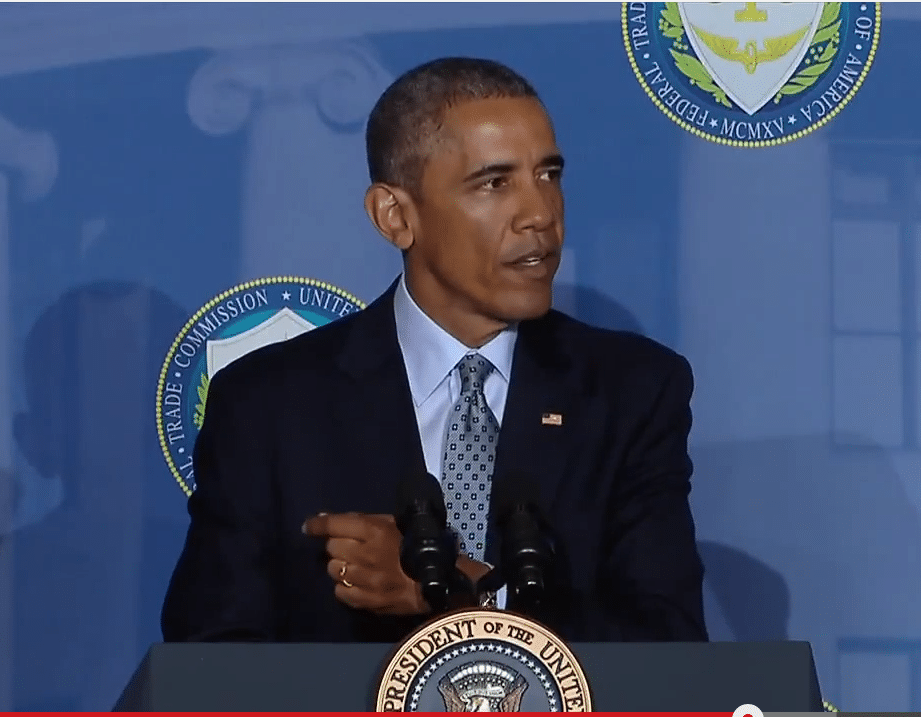
President Obama used a speech at the Federal Trade Commission on Monday to call for a raft of new laws and reforms that would protect the privacy and online security of U.S. citizens and corporations.
Speaking at the FTC, President Obama highlighted a number of policies that he will propose in his State of the Union address to Congress. They include new laws aimed at endemic problems like identity theft and online tracking of consumer behavior.
The visit was notable for being the first time a sitting President has visited the FTC in 80 years, since 1937 and the administration of Franklin D. Roosevelt. Obama, who has been highlighting issues and ideas he will unveil in his State of the Union Address, said the address is one of a series of talks he will give this week focused on computer and online privacy. The President said he will follow his speech aimed at consumers at the FTC with an address on the subject of private-public partnerships on preventing cyber attacks at the Department of Homeland Security.
“So much of the prosperity we seek…depends on our digital economy,” Obama told an audience at the FTC. “As we’ve all been reminded of in the past year, including the hack of Sony, this enormous interconnection creates enormous opportunities but also creates enormous vulnerabilities for us as a nation, for our economy and for individual families,” he said.
The Personal Data Notification & Protection Act is another swing at a long postponed Federal data breach notification law. The Act would clarify and strengthen laws that obligate businesses to notify customers when their personal information has been exposed. Among the changes would be a uniform, federal 30-day notification requirement from the discovery of a breach. The illicit trade of stolen identifies would also be criminalized.
Also proposed: The Student Digital Privacy Act, which is designed to protect the data collected in the educational context from uses other than educational purposes. Companies that collect data from students would be prohibited from selling it to third parties for purposes unrelated to the educational mission. Students would also be shielded from targeted advertising informed by data collected in school.
Finally, the President proposed a Consumer Privacy Bill of Rights that would articulate federal guidelines covering the “context in which data is collected and ensure that users’ expectations are not abused.” According to a statement from the White House, the Commerce Department has completed public review of revised draft legislation enacting the Bill of Rights. The Administration plans to release a legislative proposal that incorporates public feedback within 45 days.
The announcement was the latest in a string of policy moves by the Administration – all of them Executive actions that do not require an Act of Congress.
In October, the President gave a boost to efforts to introduce more secure credit card technology in the U.S., issuing an Executive Order requiring that so-called “Chip and PIN” technology be used on any new or existing government debit and credit cards.
In recent weeks, the Obama Administration also took steps to penalize the government of North Korea for its alleged involvement in an attack on Sony Pictures Entertainment.
The President said that an increase in online threats and crime, like identity theft, have left Americans feeling as if they have lost control of their personal information — a development that could stifle innovation and economic productivity if not addressed.
In addition to the proposed legislation, the White House announced steps by private sector firms to support its agenda. JPMorganChase, Bank of America, USAA and State Employees’ Credit Union all announced that they would offer free credit reports to their customers.
Also, 75 companies that sell products and services in the education space signed a pledge created by the Future of Privacy Forum and the Software & Information Industry Association. That pledge commits them to provide parents, teachers, and students with what are described as “important protections against misuse of their data.”
Read more via the White House web site with: FACT SHEET: Safeguarding American Consumers & Families | The White House.
